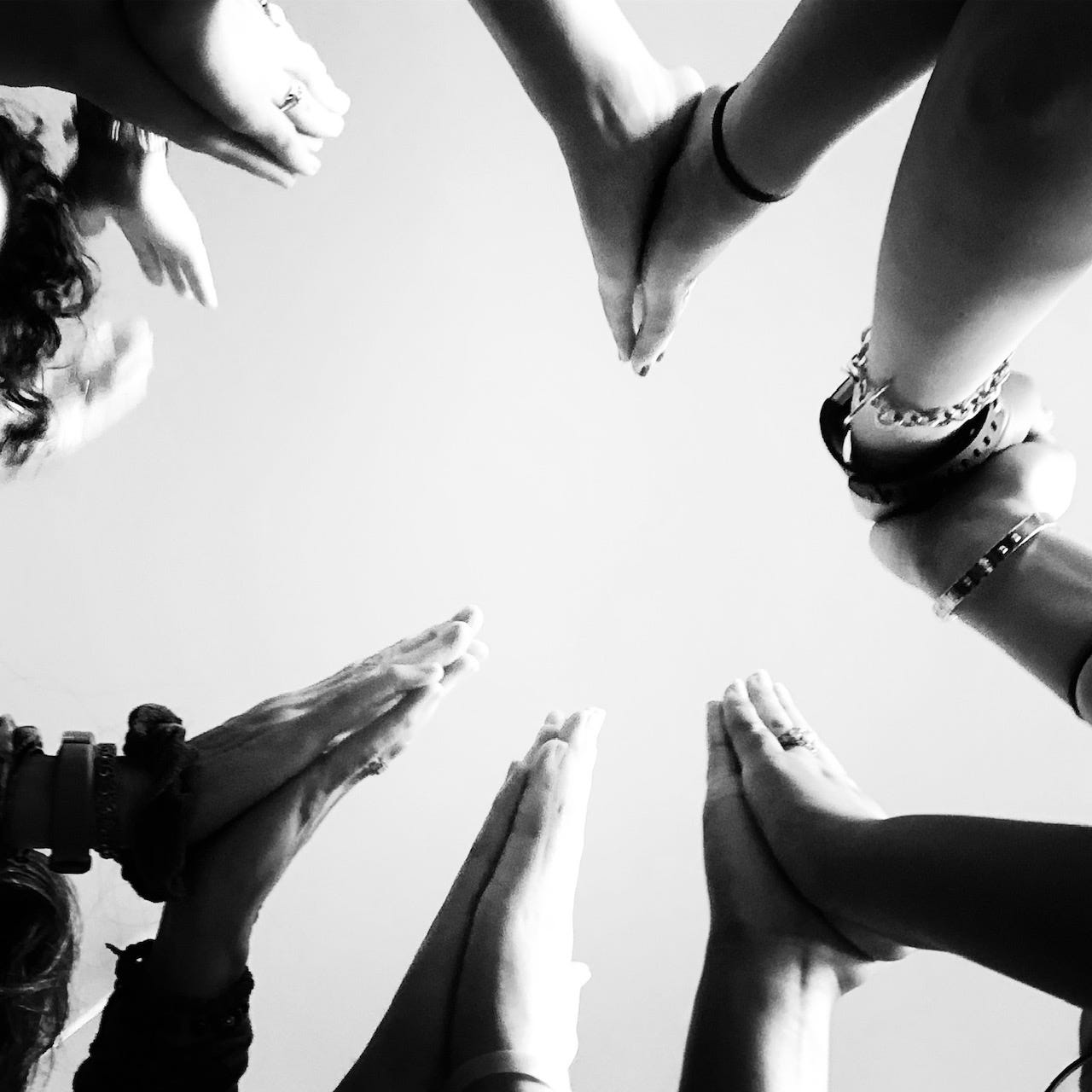What happens at an In Tending caregiver circle?
Come for the caregiver-to-caregiver connection, stay for the inner clarity.
As I’ve written before, caregivers are the experts on the ways in which our current crises are impacting our most vulnerable community members, and how best to compassionately respond.
We’re also often very tired, and need spaces where we too can be vulnerable and held.
Before I became a parent to a neurodivergent child, I used to head to a Buddhist meditation center in midtown NYC on the regular and take yoga classes a few times a week. This helped me to set down the burdens I was carrying for a while, and exit feeling grounded and resourced again.
Now that I’m six years into this parenting gig, I have slowly come to grasp the ways in which the timing, pacing, pricing structures and overall vibe of these spaces can feel less-than-inclusive for those with caregiving responsibilities — not to mention those who are not also white, able-bodied, young, thin, neurotypical-presenting, and/or upper-middle class.
This leaves out a lot of people.
Enter: In Tending online gatherings.
Our donation-based circles were designed around the needs and schedules of busy caregivers who are interested in building community. Our aim is to share something that no amount of Instagram scripts and parenting podcasts can provide: a sense of being witnessed, of being understood, of belonging somewhere.
Below, please find answers to the FAQs people have asked about these gatherings, as well as information on how to get on the invite list for the next one.
Who counts as a caregiver?
Anyone who spends a significant portion of the day tending others, tending community, and/or tending the earth.
This means not just teachers and nurses, but also body workers, food service professionals, farmers, adult children who care for elderly or sick relatives, and parents of all gender identities who work inside the home.
In other words: ours is a big tent. We leave it up to you to decide if it’s the one for you.
Who facilitates these gatherings?
Ryan (Weaver) Cherecwich, M.Ed and Meredith Rodriguez. We both use she/her pronouns. We are both experienced facilitators, educators and parents, with a great deal of combined experience in supporting aging parents, loved ones with chronic illnesses, children with special needs, children of color, and queer folks.
We also both have backgrounds in leading mindfulness and writing work, which we love offering during our gatherings.
It is our pleasure to hold the space for you.
What happens during an In Tending online gathering?
We spend an hour or so together. During this hour, we:
Have a brief preliminary check-in, to hear what kinds of needs (and joys!) folks are bringing into the space.
Offer some guided meditation, tailored to the group and discussion topic. (No breathy vocals, no New Age flutes, just techniques to help us arrive and drop in together.)
Have a longer circle-based discussion, with equitable talk time for all. In the past, we’ve chosen topics like caring for kids in K-12, caring for adults, and affirming neurodivergence.
Brainstorm topics we’d like to discuss for the next gathering. We also discuss anything else that needs to shift to be more responsive to the needs of the people in the group.
Why do people come to these gatherings?
In Tending circle attendees have told us that they come for the following reasons:
A sense of being seen and affirmed as a caregiver across many spaces – whether we are caring for young kids, struggling partners, patients/students, and/or aging elders.
A group offering support in beginning or returning to an intentional mindfulness practice as a way of tending to ourselves amidst all of this, as well as a way of bringing peace to our wider communities.
A group to normalize the inherent tensions between mindfulness and caregiving, as well as the joyful intersections between them.
A community of people who will Go There, beyond the surface level – offering not just small talk or “venting,” but fun and laughs, a place to share ideas for action, advocacy and art, and gentle accountability when we find any of this hard to access.
Communion with those who value liberation, equality and justice.
Are there any rules or norms I need to be aware of before joining a circle?
Caregiving is personal; it is also political. We’ve found that having a set of community norms helps to keep our discussions focused on the intentions above, and to set our gatherings apart from other gatherings that may feel more like informal venting sessions or formal workshops.
Please read these norms before you sign up.
Be you, but also be mindful of others. Be you means that if you are sad and you need to cry, cry. If you are angry and you need to swear, swear. Care work is not always calming, and thus calmness is not required or expected as we discuss and reflect on it. That said, be mindful of how you discuss issues such as gender, race, class, language, family structure, sexual orientation, and religious affiliation hat may also touch others deeply, in ways that are different from yours. Per the norms of the East Bay Meditation Center: “Instead of assuming that our individual and culturally-based collective ways of knowing are the norm, we can choose to mindfully engage with others in culturally humble ways that might help us to learn, grow, respect, and better understand the reasons for their actions and behaviors, while we also become increasingly aware of what motivates our own actions and behaviors.”
Given that:
Use “I” statements. It would be very easy, given our current political context, to begin to talk about other groups of people for whom you are either very worried, or towards whom you are feeling anger. In our groups, we aim to stay grounded in sharing the particulars of our own care contexts – what’s hard or joyful for us – rather than making generalizations about what things might be like for other people. This is also a space to explore your lived experience and your values when it comes to care, rather than to cite the thoughts of someone else (i.e. a political figure) who isn’t in the room, or in the work of care, alongside us.
Connect and care, but don’t compare. This is related to the one above. It’s okay to build on one another’s comments or wisdom, but please don’t compare or frame your situation as better or worse than someone else’s. Your hardest thing is your hardest thing. The same is true for others.
No fixing or advice unless it is requested. This is a big one for us as caregivers. We are all adults, and it is important to respect our fellow adults by not presuming we know the answers, while also respecting our own time and energy by not offering from an already depleted place. In this space, just listening and speaking from the heart is enough.
What is said here, stays here; what is learned here, leaves here. Confidentiality is vital for building and maintaining trust and safety. We honor confidentiality in all cases except those in which someone is imminently at risk of harm. That said, wit is OK to share the insights gained from our circles with others — without names or other identifying details.
Help keep our container secure. To help us ensure that all participants are real humans, we would love it if you turned your camera on to greet the group as you enter the space, and keep it on if you are not in a distracting environment. We would also prefer you choose a space where no other adults can overhear what is being shared. This helps to keep our space workable and confidential for all. That said, if you need to switch your camera off briefly (i.e. if you need to breastfeed a baby and would be more comfortable doing so off-camera), just drop us a note in the chat to let us know so we can respond accordingly.
Expect and accept non-closure. We aren’t going to solve any of the issues we discuss in a single session. Our intention is to build a community with the capacity to witness us, as we consider the next right thing in our respective communities.
I can’t come to all of the circles. Can I still drop in to one of them?
Yes! We strive to highlight topics that have wide relevance in our community of caregivers, and to choose times that work for the majority, but we understand that there’s no universal time or topic that will work every time for every person. We’re delighted to have you whenever you can join.
Do I have to pay to join?
We welcome donations, in alignment with the longstanding tradition of dana in many mindfulness communities. (See Insight Meditation Society’s explanation of this, for one example.) However, if cost is a barrier, you can indicate this in our circle sign-up form, and we’ll work to get you access to our community, no questions asked.
Where and when do the meetings take place?
Currently, we’re using Zoom and targeting mornings on the East Coast, but we hope to offer more sessions for different time zones and schedules as we build this community.
Okay, I’m in. How do I sign up?
Click the button below to fill our our circle intake form, and we’ll send you the Zoom invite to the next circle!
(Note: If you are a paid subscriber, you do need to fill out the form so we have your contact info, but know that access to this event is included with your subscription — and if you’re not a paid subscriber, you can upgrade below.)
Do you ever lead caregiver circles offline?
Yes! We’ve facilitated discussions like this for folks in a variety of places, from converted barns to classrooms. If you’d like to get in touch with us about a potential in-person circle, please shoot us a DM on Substack and we’ll go from there.
I have a question that’s not on this list. How can I ask it?
If you received this via email, just hit “reply” and it will come to our inboxes. If you’re viewing this in a browser, drop a comment below and we’ll happily respond.
We look forward to meeting you!
xoxo, Ryan and Meredith






